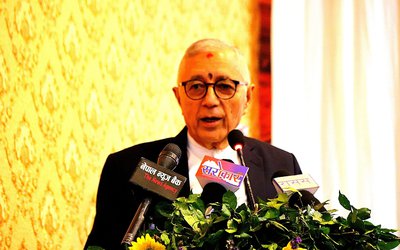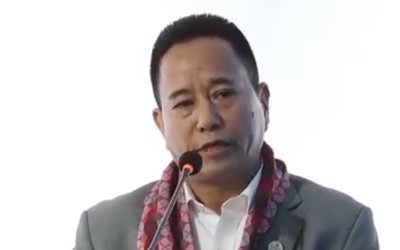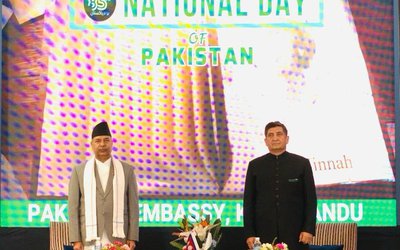
Global Affairs Canada, in partnership with the United Nations Economic and Social Commission for Asia and the Pacific (ESCAP) and the Government of Nepal, held a consultation related to a new initiative to support the growth of women entrepreneurs as a strategy to address poverty reduction, improve social well-being and promote sustainable economic growth.
The five-year project titled, ‘Catalyzing Women’s Entrepreneurship: Creating a Gender-Responsive Entrepreneurial Ecosystem’ aims to create an enabling policy and business environment that enhances women entrepreneurs’ access to capital through innovative financing mechanisms as well as increase their use of ICT and digital solutions.
In September 2018, Global Affairs Canada announced a $13.9 million grant to ESCAP, over five years (2018-2023) for projects that aim to reduce the barriers women-owned micro, small and medium-sized enterprises (MSMEs) in South Asia, Southeast Asia and the South Pacific face in growing their businesses. For example, access to finance is a key barrier that the project will address through the use of innovative financing mechanisms, such as impact investing and women`s bonds.
More than 110 policymakers, MSME representatives and other stakeholders participated in today’s national consultation on integrating women’s needs and considerations into policy and other initiatives supporting entrepreneurship, financial inclusion and creating an enabling environment for businesses.
“Promoting gender equality and empowering women and girls is the most effective approach to achieving sustainable development goals,” said Amanda Strohan, Acting Deputy Ambassador of Canada to Nepal. “However, women entrepreneurs continue to face barriers. Tackling the unique challenges faced by women entrepreneurs will require innovative approaches, including novel financing mechanisms and technologies. Canada is pleased to support the Catalyzing Women’s Entrepreneurship project to provide women-owned enterprises in Nepal with the resources, skills and an enabling environment needed to grow their businesses and generate sustainable and inclusive economic growth.”
“Developing women’s entrepreneurship presents an invaluable tool for boosting Nepal’s economy as well as empowering women. Yet women’s entrepreneurship is hindered by lack of access to finance and ICT tools for business development. The case for investing in women’s economic empowerment is compelling. Women are true agents of change whose innovations can lift companies, communities, and countries. Together, governments, the United Nations, civil society and the private sector can improve women’s and girls’ prospects,” said United Nations Under-Secretary-General and Executive Secretary of ESCAP Armida Alisjahbana.
During the consultation, ESCAP and the United Nations Capital Development Fund (UNCDF) announced the winners of the project’s Women Fintech MSME Innovation Fund and thanked the Government of Canada, the Dutch Development Bank (FMO) and Visa Inc. for their support to this initiative. Nepal’s Aeloi Technologies and Khalti (Sparrow Pay) were among the 10 winning innovative business models.
In recent years, Nepal has made significant progress regarding its socio-economic status. However, it is estimated that women own only three per cent of MSMEs and face various barriers to entrepreneurship. These barriers include, amongst others, limited access to finance and ICT infrastructure, lack of financial and business knowledge, and discriminatory social norms.
Aeloi Technologies, one of the winners of the Women Fintech MSME Innovation Fund has proposed to introduce a green energy mobility platform to Kathmandu.
Khalti, another winner, is developing a mobile wallet and payment gateway for the first time bankers in Nepal. Khalti intends to onboard women MSMEs by providing financial and digital literacy training through their local partners.
The Canada Fund for Local Initiatives announced a total grant of $77,900 to three projects to be implemented by civil society organizations in Nepal this year. The projects include Reducing incidences of sexual and gender-based violence in Godavari Municipality in Nepal through transformative behavioural change, including awareness-raising, training and advocacy; to be implemented by Prerana. Decreasing violence and discrimination against LGBTIQ+ people in Nepal through sensitization workshops, capacity building, media messaging, and local stakeholder coordination meetings; to be implemented by Blue Diamond Society.
Promoting the adoption of climate smart agriculture practices among female smallholder farmers of Kageshwori Manohara Municipality through integrated training and establishment of resource centres/demonstration sites of Climate Smart technologies; to be implemented by Small Earth Nepal.
- Pakistani Embassy In Kathmandu Hosted A Reception On 85th National Day
- Apr 16, 2025
- Earthquake Rocks Kathmandu Valley
- Apr 16, 2025
- Prof Dr Khadga KC assigned responsibility of TU Vice Chancellor
- Apr 16, 2025
- Weather Forecast: Partly Cloudy With Brief Rain In Kathmandu, Surkhet And Pokhara
- Apr 16, 2025
- Continuous Earthquake Tremors In Jajarkot
- Apr 15, 2025















